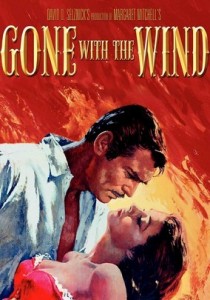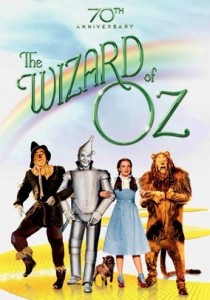Gone With The Wind-1939
Director Victor Fleming/George Cukor
Starring Clark Gable, Vivien Leigh, Olivia de Havilland
Top 250 Films #22
Scott’s Review #201
Reviewed December 4, 2014
Grade: A
Gone with the Wind (1939) is the grand masterpiece of sweeping epic drama.
The film is based on Margaret Mitchell’s best-selling novel. Set in the American South (specifically, Georgia) during the Civil War era, it centers on the life of Scarlett O’Hara, a Southern belle who works on the cotton plantation Tara. After the South loses the war, she struggles to keep her plantation alive.
Initially, Scarlett cares little about the war but enjoys her spoiled, narcissistic lifestyle and romances with many men in the town, all vying for her attention. With all eyes on her, she revels in one sunny picnic and ball after another.
As war decimates the South, Scarlett must take over the plantation and survive the ravages of war.
Mixed in with the war theme is a romance between Scarlett and Rhett, one of cinema’s most recognized and enduring couples. Having gone through three directors (Victor Fleming, George Cukor, and Sam Wood), the film is as extravagant and precise in its style, attention to detail, and set design as films come.
At close to four hours, Gone with the Wind is a lavish production that can take an entire afternoon or evening to watch. It is divided into two halves—interestingly, Cukor directs the first half, and Fleming primarily directs the second.
It is a film that can be viewed and analyzed repeatedly, and the set pieces and flawless perfection alone are worthy of marvel. The first half is superior to the second, but that is like comparing prime rib to filet mignon—it’s a matter of personal preference.
The first half is brighter, cheery, and fantastic. The excellent Tara and neighboring plantation Twin Oaks host southern balls and parties filled with romance, gossip, and beautiful costumes. War is coming, but it is a delightful time of merriment.
The Southerners eagerly embrace the prospect of war, assuming it will last only two weeks and that they will emerge victorious. They party and celebrate.
The second half has a much darker tone.
By the beginning of the second half, Atlanta has burned, thousands of men have died, Tara is decimated, Scarlett’s mother has died, and her father has gone batty.
The rebuilding of the South is explored, the troubled Rhett and Scarlett marriage commences, their daughter dies, and the world-famous line uttered by Rhett to Scarlett, “Frankly my dear…. I don’t give a damn”.
Having been now directed by a different person (Fleming), the first and second halves almost seem like two separate films.
Vivien Leigh plays a beautiful role. In 1939, women were rarely portrayed as strong characters in films, so Gone with the Wind is groundbreaking for its portrayal of female characters.
Scarlett is selfish but rises above, is strong, saves her plantation, and succeeds as a successful businesswoman—almost unheard of in cinema in 1939. Her undying love for Ashley Wilkes but her inability to obtain him (he is married to his cousin Melanie) gives her a sympathetic vulnerability.
Clark Gable, already a massive star and the people’s choice to play Rhett, is charismatic and handsome. The fact that he and Leigh did not get along makes their fights and sexual tension electric. They love but hate each other, which is transmitted on screen.
Rhett is his own man—he defines himself as not a Northerner but not a Southerner. He is a vagabond and spends many nights at the local brothel in the company of Belle Watling. Rhett’s character is independent and strong.
The supporting characters are colorful, lively, and humorous. Aunt Pittypat’s dramatic worrying and smelling salts and Prissy’s insistence on expert childbirth when, in reality, she knows nothing is moments meant to lighten the mood.
Mammie, Scarlett’s mother figure, is a moral, kind, yet tough character. Melanie (Olivia de Havilland) is an even sweeter character, characterized by her caring and selflessness.
Lesser characters, such as Dr. Meade, Suellen, Carreen, India, and Frank Kennedy, serve their purpose and are no throwaways.
It is bothersome that, over the years, Gone with the Wind has been unfairly “feminized” once it began airing as an alternative to the annual Super Bowl. The assumption was that only women would enjoy it, which is silly.
I do not find this film to be a female film, and frankly, some of the battle scenes are pretty masculine, with epic fires and guns galore. Is Gone with the Wind now considered a racist film?
Perhaps so, and time has made the political incorrectness much more glaring- this point can be debated endlessly. Ashley participates in a hooded Klan organization and is portrayed as a hero in the film.
Indeed, throughout the film, the enslaved people are portrayed as happy, kindly, and comfortable with their place in life, vastly different from what transpired. However, Hattie McDaniel (Mammie) won the first-ever Oscar for a black actress, which was monumental progress and influence.
Using seemingly thousands of extras, the war-torn Atlanta scene where the camera rises up and up and up, panning down on hundreds of wounded and dead Union soldiers as Scarlett defeatedly walks among them, is still heartbreaking to watch and is a reminder of the power and destruction that war is.
Gone with the Wind is an epic masterpiece from the past that still holds up remarkably well. The sets, the rich characters, and the costumes can be admired and still inspire today.
Oscar Nominations: 8 wins-Outstanding Production (won), Best Director-Victor Fleming (won), Best Actor-Clark Cable, Best Actress-Vivien Leigh (won), Best Supporting Actress-Hattie McDaniel (won), Olivia de Havilland, Best Screenplay (won), Best Original Score, Best Sound Recording, Best Art Direction (won), Best Cinematography, Color (won), Best Film Editing (won), Best Special Effects

